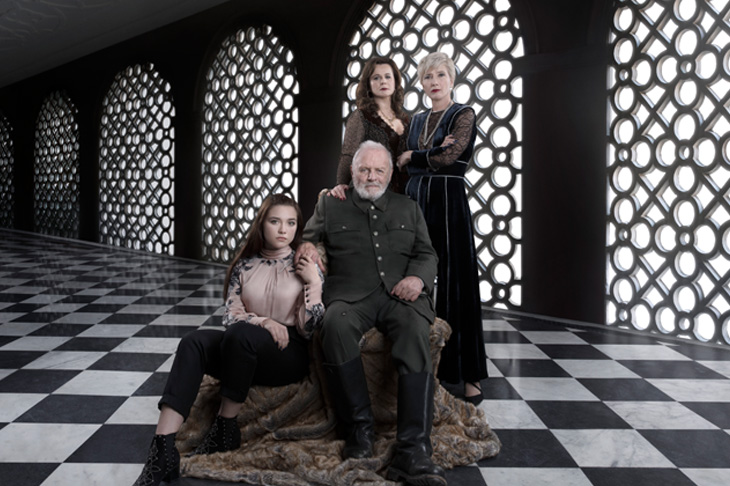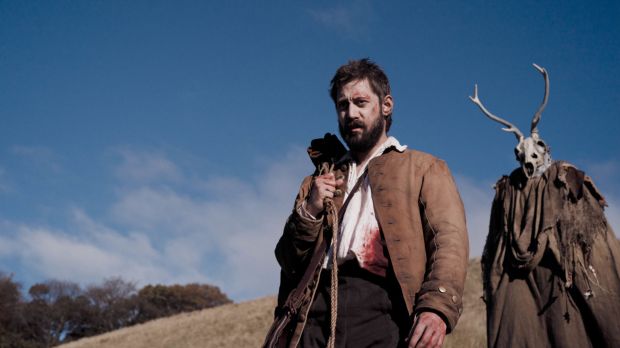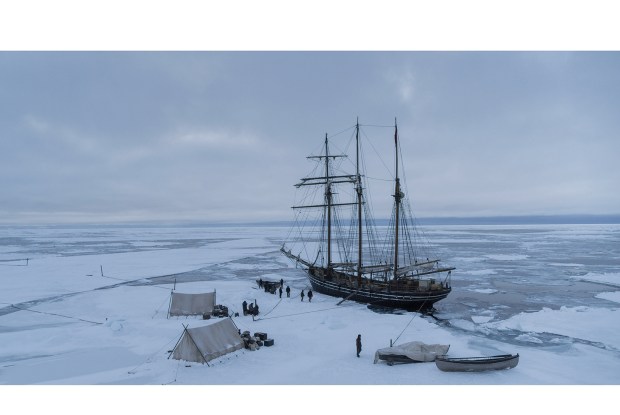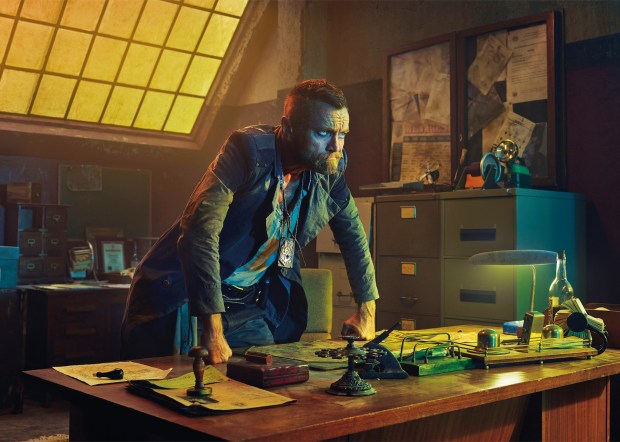I recently came across a theory of the American poet Delmore Schwartz’s that Hamlet only makes sense if you assume from the beginning that all the characters are drunk. Given Schwartz’s own fondness for booze, this idea perhaps smacks of drunken hyperbole itself. But it certainly sprang to mind while watching BBC2’s King Lear (Monday), where Anthony Hopkins spent quite a lot of the first half swigging enthusiastically from a hipflask.
After all, this did appear to explain much of Lear’s behaviour: the constant alternation between belligerence and sentimentality; the combination of self-dramatisation, self-pity and — the way Hopkins played it — self-amusement; and maybe even that initial decision to divide his kingdom in a spectacularly misguided bid to prevent ‘future strife’. (Might Lear have possibly woken up the following morning wondering just what the hell he’d done the night before?)
Directed by Richard Eyre, the programme opened in what seemed to be present-day Britain under military dictatorship. After a few establishing shots of the Shard, the Gherkin and so on, the camera zoomed into a heavily guarded Tower of London where Lear was about to announce his doomed plan around a shiny conference table.
In fact, for a while, this updating seemed both half-hearted and a bit confusing. If Lear really was a military dictator, why did everyone keep calling him a king? Why were there no modern media in evidence as the country/kingdom fell apart? Why did Goneril live in a contemporary home counties mansion, but Gloucester in an old-style Tudor palace? Why, for that matter, were 21st-century people swearing ‘by Apollo’?
Gradually, though, it became apparent that these inconsistencies were a deliberate attempt to reimagine Shakespeare’s ahistorical world where realism and myth jostle together. Admittedly, even when you did appreciate this, there were some jarring moments. The refugee camp in the storm scene felt like a somewhat desperate stab at shoehorning in some ‘relevance’. The climactic hi-tech battle in the suburbs of Dover (complete with Cordelia in military fatigues) seemed like something that the original military-dictatorship conception meant that Eyre was rather stuck with. Nonetheless, the overall result definitely served to remind us of just what a strange, and at times utterly wild, play this is.
And also, of course, what a toweringly great one. As Lears go, Hopkins’s was notably understated. Plainly determined to avoid histrionics, he delivered the line ‘I would not go mad’ in an affecting memo-to-self mutter — and the ‘Blow, winds’ speech with more resignation than defiance, almost in the manner of someone quoting a spot of Shakespeare in an effort to keep his spirits up.
But Hopkins also made it heartbreakingly clear that all of this represented Lear’s attempts at self-protection. This in turn ensured that when the attempts failed, and Lear was left wholly defenceless, the impact was all the more wrenching, especially in the scene (by far the most successful piece of updating) when he met the blinded Gloucester while pushing a trolley through a bleak shopping centre as a tramp. Similarly, the sense that he’d been trying out, or impersonating, various versions of himself throughout the play made his self-acceptance during the reconciliation with Cordelia both achingly painful and somehow triumphant at the same time.
And naturally, with Hopkins on board, the rest of the cast was pretty terrific as well — to the point of unexpectedly turning King Lear into something of an ensemble piece. By my reckoning at least six other characters made their equally well-delineated progress to self-awareness, even if the self that some of them became aware of was not one many people would welcome.
Emily Watson’s Regan, for example, had obviously never felt more alive than when blinding Gloucester: a scene rendered all the more terrifying by the fact that Gloucester was played, with increasing charm and vulnerability, by Jim Broadbent. Emma Thompson’s Goneril may have started out as a house-proud home counties hostess, understandably aghast that her drunken old dad had brought 100 soldiers to stay, but in Thompson’s hands, the gleefully malevolent monster she became seemed not so much an aberration as an inevitability.
It’s possible, I suppose, that some Shakespeare purists — or old grumps — might have objected to the fact that Monday’s production cut King Lear to less than two hours. Yet, speaking as someone who on a bad day could fall into either category, I have to admit that only by looking through the text later did I realise what had been lost. (Turns out that some of it was pretty good, too.) Worse still, I might also admit that lasting less than two hours was part of the programme’s appeal, particularly when Eyre managed such a winning combination of the pacy and the unhurried. And all to an effect that ended up somewhere between the devastating and the completely overwhelming.
Got something to add? Join the discussion and comment below.
Get 10 issues for just $10
Subscribe to The Spectator Australia today for the next 10 magazine issues, plus full online access, for just $10.
You might disagree with half of it, but you’ll enjoy reading all of it. Try your first month for free, then just $2 a week for the remainder of your first year.














Comments
Don't miss out
Join the conversation with other Spectator Australia readers. Subscribe to leave a comment.
SUBSCRIBEAlready a subscriber? Log in